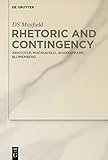Rhetoric and Contingency : Aristotle, Machiavelli, Shakespeare, Blumenberg / DS Mayfield.
Material type: TextPublisher: Berlin ; Boston : De Gruyter, [2020]Copyright date: ©2020Description: 1 online resource (XI, 888 p.)Content type:
TextPublisher: Berlin ; Boston : De Gruyter, [2020]Copyright date: ©2020Description: 1 online resource (XI, 888 p.)Content type: - 9783110701517
- 9783110701777
- 9783110701654
- 123.3 23
- BD595 .M39 2020
- online - DeGruyter
- Issued also in print.
| Item type | Current library | Call number | URL | Status | Notes | Barcode | |
|---|---|---|---|---|---|---|---|
 eBook
eBook
|
Biblioteca "Angelicum" Pont. Univ. S.Tommaso d'Aquino Nuvola online | online - DeGruyter (Browse shelf(Opens below)) | Online access | Not for loan (Accesso limitato) | Accesso per gli utenti autorizzati / Access for authorized users | (dgr)9783110701654 |
Browsing Biblioteca "Angelicum" Pont. Univ. S.Tommaso d'Aquino shelves, Shelving location: Nuvola online Close shelf browser (Hides shelf browser)
Frontmatter -- Contents -- Particularized Preface -- 1. Acknowledgments qua Inductive Overture -- General Introduction -- 2. Concerning Determinism and Contingency -- Theories -- 3. Aristotle’s Contingency -- 4. From Aristotle to Quintilian, and Beyond -- Methods -- 5. Induction and Contingency -- Mise en Scène -- 6. Contingency and Cynicism in Celestina -- 7. Brutal Latencies. On the Crafting of Political Union -- 8. Otherwise. Rhetorical Techniques of Contradiction -- 9. Make Life Art—An Immoral Imperative -- Philosophistics -- 10. Life Being Brief (No Need to Cut It Short)— Concerning Blumenberg’s Senecan Affinities -- 11. Blumenberg’s Rhetoric—With a Case Study on Fontane -- 12. Blumenberg’s Fauna -- 13. Virtuosity and Effectuality -- Bibliography -- Index
restricted access online access with authorization star
http://purl.org/coar/access_right/c_16ec
Human life is susceptible of changing suddenly, of shifting inadvertently, of appearing differently, of varying unpredictably, of being altered deliberately, of advancing fortuitously, of commencing or ending accidentally, of a certain malleability. In theory, any human being is potentially capacitated to conceive of—and convey—the chance, view, or fact that matters may be otherwise, or not at all; with respect to other lifeforms, this might be said animal’s distinctive characteristic. This state of play is both an everyday phenomenon, and an indispensable prerequisite for exceptional innovations in culture and science: contingency is the condition of possibility for any of the arts—be they dominantly concerned with thinking, crafting, or enacting. While their scope and method may differ, the (f)act of reckoning with—and taking advantage of—contingency renders rhetoricians and philosophers associates after all. In this regard, Aristotle and Blumenberg will be exemplary, hence provide the framework. Between these diachronic bridgeheads, close readings applying the nexus of rhetoric and contingency to a selection of (Early) Modern texts and authors are intercalated—among them La Celestina, Machiavelli, Shakespeare, Wilde, Fontane.
Issued also in print.
Mode of access: Internet via World Wide Web.
In English.
Description based on online resource; title from PDF title page (publisher's Web site, viewed 25. Jun 2024)









